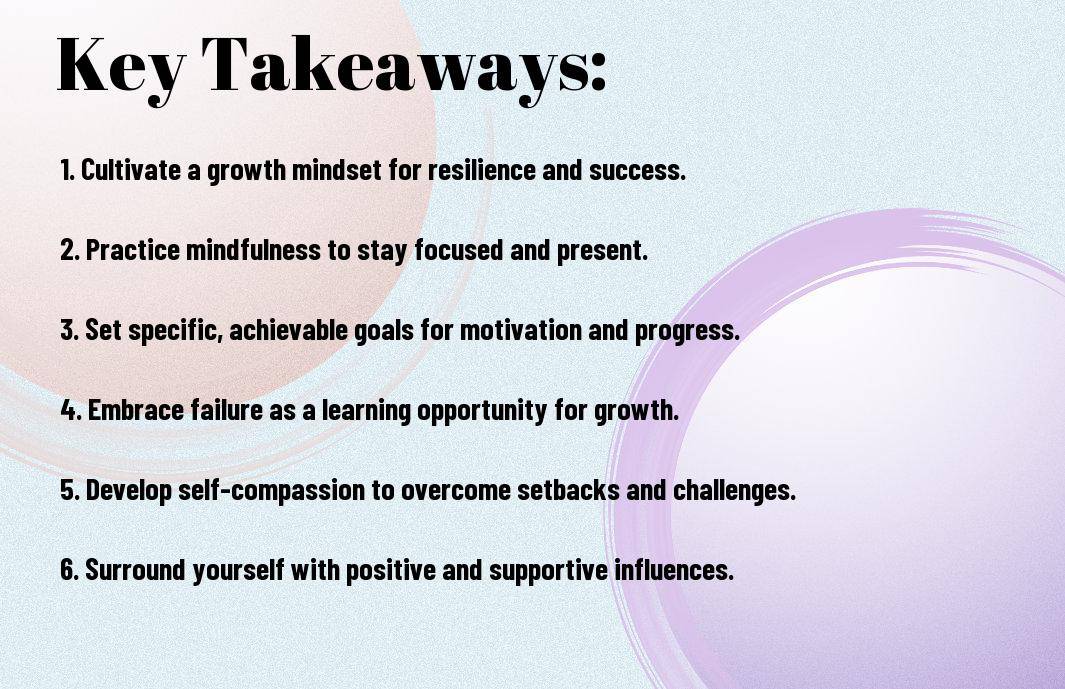Overcoming challenges and reaching goals require a strong and resilient mindset. Mastering mindset techniques is crucial for individuals looking to achieve success in various aspects of life. By implementing effective strategies, one can build resilience and stay focused on their goals even in the face of adversity. Learning how to manage stress, handle setbacks, and stay motivated are key components of mastering mindset.

Key Takeaways:
- Understanding mindset: Mindset plays a crucial role in shaping our thoughts, behaviors, and ultimately our success in achieving goals.
- Cultivate self-awareness: Developing self-awareness allows us to recognize our thought patterns, emotions, and behaviors, enabling us to make necessary changes for growth.
- Practice positive thinking: Adopting a positive mindset can help reframe challenges as opportunities for growth and learning.
- Set realistic goals: Setting achievable and specific goals provides a clear direction and motivates us to take action towards success.
- Forge resilience: Building resilience enables us to bounce back from setbacks, adapt to change, and persevere in the face of challenges.
- Embrace a growth mindset: Believing in our ability to improve and develop talents through effort and perseverance fosters resilience and enhances goal achievement.
- Seek support: Surrounding ourselves with a strong support system of friends, family, mentors, or coaches can provide encouragement, guidance, and accountability in our journey towards mastering mindset.

Understanding Mindset
Little is understood about the power of mindset and its influence on our thoughts, behaviors, and ultimately, our success. This chapter investigates into the intricacies of mindset and provides valuable insight into how we can harness its potential to achieve our goals and build resilience.
The Psychology Behind Mindset
Psychology plays a crucial role in shaping our mindset. Our beliefs, perceptions, and attitudes are all deeply rooted in our psychological makeup. Understanding how our minds work and how our thought patterns evolve is key to mastering our mindset.
Fixed vs. Growth Mindset
Mindset is a powerful determinant of our attitudes towards success and failure. Individuals with a fixed mindset believe that their abilities are innate and unchangeable, leading to a fear of failure and a reluctance to take on challenges. On the other hand, those with a growth mindset see failures as opportunities for growth and believe that their abilities can be developed through dedication and hard work.
Behind the choice between a fixed and growth mindset lies a fundamental difference in how individuals perceive their own capabilities and approach challenges. Cultivating a growth mindset can unlock immense potential and lead to greater resilience and success in life.
The Impact of Mindset on Behavior and Success
Mindset not only influences our attitudes but also shapes our behaviors and ultimately determines our level of success. Those with a growth mindset are more likely to persevere in the face of challenges, seek out opportunities for growth, and ultimately achieve their goals. On the other hand, a fixed mindset can limit our potential and hinder our ability to overcome obstacles.
Another critical aspect of mindset is its impact on how we approach success. Individuals with a growth mindset are more likely to view success as a result of effort and perseverance, while those with a fixed mindset may attribute success to innate talent or luck. Understanding the implications of our mindset is key to unlocking our full potential and achieving our goals.

Cultivating a Resilient Mindset
After facing adversity, many individuals find themselves questioning their ability to bounce back and thrive amidst challenges. However, resilience is not an innate trait but a skill that can be developed and strengthened over time. If you’ve ever pondered how to measure your resilience, you’re not alone. In fact, Quora user shared insights on the topic, highlighting the importance of understanding resilience in a technology-driven world.
Defining Resilience and Its Significance
On the journey to cultivating a resilient mindset, it’s crucial to comprehend what resilience truly means and the significance it holds in navigating life’s challenges. Resilience can be defined as the ability to adapt and bounce back from setbacks, challenges, and adversity. It involves coping effectively with stress, overcoming obstacles, and thriving in the face of adversity. The significance of resilience lies in its capacity to empower individuals to persevere through tough times, maintain a positive outlook, and emerge stronger from difficult situations.
Strategies for Enhancing Personal Resilience
On the quest to enhance personal resilience, individuals can engage in various strategies that foster a resilient mindset. These strategies include developing a growth mindset, practicing self-care and self-compassion, cultivating strong social connections, setting realistic goals, and embracing change as a stepping stone for growth. By adopting these strategies for enhancing personal resilience, individuals can build a solid foundation for navigating life’s ups and downs with grace and strength.
Mindset: By cultivating a mindset focused on growth, self-care, and adaptability, individuals can equip themselves with the tools needed to overcome adversity and emerge stronger.
Overcoming Setbacks with a Resilient Mindset
Cultivating a resilient mindset is crucial for overcoming setbacks and thriving in the face of challenges. When setbacks occur, individuals with a resilient mindset are better equipped to bounce back, learn from their experiences, and adapt to new circumstances. By viewing setbacks as opportunities for growth and staying resilient in the face of adversity, individuals can navigate life’s obstacles with resilience and determination.
Mindset: A resilient mindset is not about avoiding setbacks but about embracing them as learning opportunities and using them to fuel personal growth and development.

Goal Setting for Success
For Mastering Resilience and achieving goals, setting clear and achievable goals is important. By defining specific targets, individuals can create a roadmap towards success, increase motivation, and track progress effectively. To master mindset and achieve desired outcomes, understanding the principles of effective goal setting is crucial.
Principles of Effective Goal Setting
Setting realistic and measurable goals is the cornerstone of effective goal setting. Goals should be specific, attainable, relevant, and time-bound (SMART). Additionally, aligning goals with personal values and long-term objectives ensures a sense of purpose and direction. Regularly reviewing and adjusting goals based on progress and circumstances enhances adaptability and resilience in pursuing objectives.
Short-term vs. Long-term Goal Planning
Any individual aiming for success must balance short-term and long-term goal planning. Short-term goals provide immediate targets and milestones, fostering a sense of achievement and progression. In contrast, long-term goals establish a broader vision and direction, enabling individuals to stay focused on the bigger picture. Both types of goals complement each other, creating a holistic approach to goal setting.
Goal setting involves outlining specific, clear, and measurable objectives that align with personal aspirations and ambitions. By defining short-term and long-term goals, individuals can create a roadmap for success, breaking down larger objectives into manageable tasks and milestones.
Tools and Techniques for Tracking Progress
Success in achieving goals relies heavily on tracking progress effectively. Utilizing tools such as to-do lists, goal journals, progress trackers, or digital apps can help individuals monitor their advancement, stay organized, and make adjustments when necessary. Regularly reviewing progress, celebrating achievements, and reflecting on setbacks provide valuable insights and motivation to continue pursuing goals.
Shortterm, consistent tracking of progress not only ensures accountability but also helps individuals stay motivated and focused on their objectives. By utilizing various tools and techniques, individuals can overcome obstacles, adapt to changes, and maintain momentum towards achieving their goals.
Mindfulness and Mental Clarity
Once again, welcome to another chapter in our journey to mastering mindset. In today’s fast-paced and constantly changing world, it is crucial to cultivate a practice of mindfulness to enhance our mental clarity and resilience. The ability to stay present and focused can help us navigate challenges with grace and achieve our goals with intention.
Mindfulness is the practice of being fully present in the moment, aware of our thoughts, feelings, and surroundings without judgment. By cultivating a mindful mindset, we can improve our mental clarity, reduce stress, and enhance our decision-making abilities. This practice allows us to observe our thoughts and emotions without being consumed by them, leading to a greater sense of control and peace.
One of the most powerful benefits of mindfulness is the ability to develop mental clarity. When we are mindful, we can more easily discern which thoughts are serving us and which are holding us back. This clarity enables us to make better decisions, set meaningful goals, and take intentional actions towards achieving them.
Furthermore, mindfulness helps us build resilience by teaching us to accept the present moment as it is, rather than resisting or avoiding it. This acceptance allows us to respond to challenges with a clear mind and a calm attitude, rather than reacting impulsively out of fear or frustration. By cultivating mindfulness, we can develop the mental strength to bounce back from setbacks and persevere in the face of adversity.
Incorporating mindfulness practices such as meditation, deep breathing exercises, or body scans into our daily routine can significantly improve our mental clarity and resilience. These techniques help us stay grounded, focused, and present, even in the midst of chaos. By making mindfulness a priority, we can cultivate a powerful tool for building resilience and achieving our goals with clarity and intention.
Do not forget, mindfulness is not just a temporary fix, but a powerful skill that can be honed and developed over time. The more we practice being present and aware, the more we can harness the power of mindfulness to navigate life’s challenges with a clear mind and a resilient spirit.
FAQ
Q: What is mindset mastery?
A: Mindset mastery is the practice of developing mental resilience and techniques for achieving goals through strategic mindset shifts.
Q: Why is mindset mastery important?
A: Mindset mastery is important because it helps individuals build resilience, overcome obstacles, and stay focused on achieving their goals.
Q: What are some techniques for building resilience?
A: Techniques for building resilience include practicing gratitude, cultivating a growth mindset, setting realistic goals, and maintaining a positive attitude.
Q: How can I improve my mindset for success?
A: You can improve your mindset for success by practicing mindfulness, visualizing your goals, surrounding yourself with positive influences, and staying motivated through challenges.
Q: What are some common mindset traps to avoid?
A: Common mindset traps to avoid include negative self-talk, self-doubt, fear of failure, and perfectionism. These can hinder your progress towards achieving your goals.
Q: How can I stay motivated when facing setbacks?
A: You can stay motivated when facing setbacks by focusing on your progress, learning from mistakes, seeking support from others, and staying adaptable in your approach.
Q: What are the benefits of mastering mindset?
A: The benefits of mastering mindset include increased resilience, improved focus and clarity, enhanced problem-solving skills, and a greater sense of accomplishment when reaching your goals.



